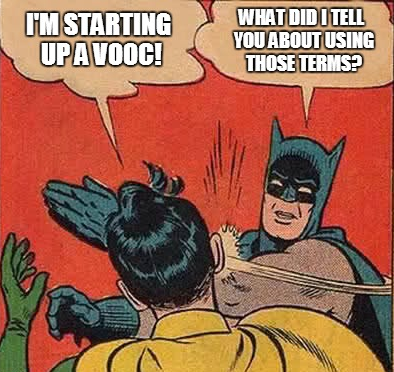Reading Time: 3 minutes

A few times in recent months I’ve had a new MOOC term pass through my Twitter feed. We haven’t had a new MOOC spin-off acronym for a good 6 months. I don’t know what’s happened to the edtech marketers, maybe they’ve been off on holiday on their new yachts spending all those edtech venture capital billions. Anyway, after a quiet start to 2014, we finally have a new buzzword to get excited about: VOOCs. Yay!
As the term started gracing my news feeds more often, I even clicked it once, and saw my old boss Donald Clark staring back at me. But it was only today that I really sat up and took notice, accompanied as it was by a curious little symbol.
VOOC®
After a long list of educational institutions and thinkers have graced us with MOOC, xMOOC, cMOOC, BOOC, SPOC, DOCC, SMOC and SOOC (I kid you not, see the timeline below…) Virtual College appear to be the first organisation actually mad enough to trademark one of these terms! It turns out the trademark was granted back in November 2013.
Now I understand why they might want to do it, but I can’t believe they actually did it. According to the UK Intellectual Property Office, trademarks are supposed to distinguish and protect your goods and services in the marketplace. So by definition this would imply that whenever you see any organisation publicising a VOOC (and believe me, we’re in for a whole LOAD of VOOC marketing this year), it should be expected that Virtual College must be involved in that course. That’s obviously plain crazy. The term VOOC is just a natural extension of the “OOC” marketing craze and could not remotely be considered a term that would identify a course as being distinctively associated with any particular institution (even the one that came up with the term). You certainly don’t think of Stanford whenever you see a MOOC advertised, but they have forged a great reputation as the ones who started it all off. And that reputation should be enough in itself. Why try and trademark the term? It kind of goes against the ‘Open’ bit too, if one institution is going to trademark it and keep it for themselves.
Virtual College are now marketing their VOOCs, but as far as I can tell they got beaten to it by Ufi, who themselves have been marketing the hell out of their own VOOC. City and Guilds are sponsoring one of the Virtual College VOOCs, and being in the line of business that they are, I am sure they’ll be quick to launch their own VOOCs too.
I guess this trademark is the logical conclusion of a long line of “OOC” terms stretching waaay back to the original MOOC. I blame Stanfard for starting all this craziness:
- MOOC (Massive Open Online Course) was first used in 2008 but only really gained momentum as a term when several Stanford University professors put their courses online in 2011, went and setup their own for-profit ventures (Coursera and Udacity), after which the whole edtech world got wind of a new revenue stream and went MOOC-crazy.
- cMOOC (Connectivist MOOC) coined by Stephen Downes in July 2012 to describe a MOOC where people learn through social networks, using blogs, wikis and social media with a focus on knowledge creation instead of acquisition.
- xMOOC, coined by Stephen Downes at the same time in July 2012 to describe the superstar professor-led MOOCs by Coursera, EdX and Udacity, which focus purely on knowledge acquisition.
- BOOC (Big Open Online Course) by Google in March 2013 . This is where it all started going a bit crazy, and this term is maybe the most pointless of the lot!
- SPOC (Small Private Online Course) coined by EdX in April 2013, in my view one of the stupidest terms ever invented (having worked in elearning since the mid-90’s, I’ve been involved in building these ‘SPOCs’ for over a decade!
- DOCC (Distributed Open Collaborative Course) in August 2013 which aims to move away from the patriarchal, superstar professor toward people learning together as a group. Basically a cMOOC.
- SMOC (Synchronous Massive Online Course) coined at University of Texas in August 2013 and featuring live, synchronous broadcasts to students.
- SOOC (Selective Open Online Course) coined by Jim Shimabukuro, editor of Educational Technology and Change online journal in November 2013 and which limit enrolment to selected students only.
- VOOC (Vocational Open Online Course) publicised by UfI in December 2013 just after Virtual College had quietly trademarked the term. Both Virtual College and UfI have launched their first VOOCs in early 2014.
I do sometimes wish I worked in marketing, it must be such fun coming up with this stuff! Where will it all end?! And will the trademark be enforced? Time will tell…
Pingback: #LTMOOC16 – Success in a MOOC | Open Thoughts